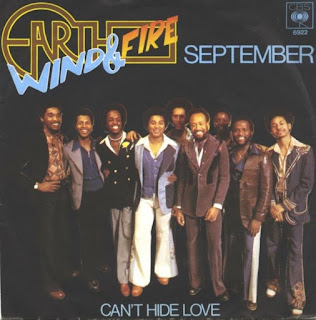EARTH, WIND & FIRE - SEPTEMBER
Publicació: 18 de novembre de 1978
Llistat: EUA: #8 Regne Unit: #3
"September" és una cançó de la banda nord-americana Earth, Wind & Fire publicada com a senzill l'any 1978 Inicialment inclosa com a tema de "The Best of Earth, Wind & Fire Vol. 1”. Juntament amb la seva versió de "Got to get you into my life", va ser una de les dues noves cançons incloses al disc, que es va convertir en el seu àlbum més venut i va ajudar a la banda a passar a un públic més ampli. "September" ha estat un dels majors èxits comercials i de crítica de la carrera d'Earth, Wind & Fire, i el vocalista Philip Bailey la considera una de les millors cançons del grup. El 2018 es va afegir a la llista del Registre Nacional d'enregistraments de la Biblioteca del Congrés dels EUA d'enregistraments sonors importants culturalment, històricament o estèticament.
Aquesta cançó té tendència a fer feliç la gent quan la escolta. Allee Willis, que va escriure la cançó amb Maurice White i Al McKay de Earth, Wind & Fire, la descriu com "Joyful Music". Va ser la primera cançó que Willis va escriure amb la banda i una experiència d'aprenentatge. Va comentar: "Escriure "September" va ser fantàstic i emocionant. Ja havien començat la introducció quan vaig entrar a l'estudi per conèixer tothom. Just quan vaig obrir la porta i vaig sentir aquella petita introducció a la guitarra, vaig pensar: Oh Déu, si us plau, deixa que això sigui el que volen treballar amb mi. Perquè, evidentment, serà un èxit". A Willis li va molestar inicialment la lletra de "ba-dee-ya" que va fer servir White a la cançó, i li va suplicar que la reescrigués: "Acabo de dir: 'Què carai vol dir 'ba-dee-ya'?' I bàsicament va dir: "A qui carai li importa?" Vaig aprendre d'ell la meva millor lliçó per escriure cançons, mai s’ha de deixar que la lletra s'interposi en el camí del ritme". Willis va co-escriure la majoria de les cançons del següent àlbum de Earth, Wind & Fire "I Am", inclòs l'èxit ". Boogie Wonderland".
Hi ha moltes teories sobre la importància de la "nit del 21 de setembre" de l’inici de la cançó, i fins al 2018, fins i tot la co-autora de la cançó, Allee Willis, estava a les fosques: Maurice White li va dir que no tenia cap significat real i que només ho va escollir perquè sonava bé fonèticament. White va morir el 2016; dos anys més tard, Willis estava dinant amb la seva vídua, Marilyn, quan li va explicar que el 21 de setembre era la data que complia en l’embaràs del seu fill, Kahbran, i que Maurice va posar aquesta data específica a la cançó com a missatge secret. Kahbran va acabar naixent abans d'hora l'1 d'agost, cosa que definitivament ja no tindria cap significat rellevant a la lletra”.
Taylor Swift va llançar una versió de banjo i guitarra acústica d'aquesta cançó el 13 d'abril de 2018 que va provocar ira a les xarxes socials. La seva gravació formava part d'una promoció d’Spotify; va explicar que ho va fer per "motius sentimentals" i perquè el mes de setembre és quan es va tenir un dels seus primers grans èxits. Philip Bailey d'EW&F la va defensar i va tuitejar: "La música és gratis així que... No sento res més que amor per tu". Jo dic que aquesta versió és una merda. Això no té res a veure amb el fet que després va fer bona música i que és una bona cantant, però aquesta versió no ho és.
EARTH, WIND & FIRE - SEPTEMBER
Released: November 18, 1978
Charted: US: #8 UK: #3
“September” is a song by the American band Earth, Wind & Fire released as a single in 1978 Initially included as a track for “The Best of Earth, Wind & Fire Vol. 1”. Along with their cover of "Got to get you into my life", it was one of two new songs included on the set, which became their best-selling album and helped the band cross over to a broader audience. "September" has been one of the biggest commercial and critical successes of Earth, Wind & Fire's career, and vocalist Philip Bailey considers it one of the group's best songs. It was added to the US Library of Congress National Recording Registry list of sound recordings that are culturally, historically, or aesthetically important in 2018.
This song has a tendency to make people happy when they hear it. Allee Willis, who wrote the song with Maurice White and Al McKay from Earth, Wind & Fire, describes it as "Joyful Music." It was the first song Willis wrote with the band, and quite a learning experience. She said: "'September' was fantastic and thrilling, and they had started the intro of it by the time I had walked into the studio to meet everyone. Just as I opened the door and I heard that little guitar intro, I thought, Oh God, please let this be what they want to work with me on. Because it was so obviously a hit." Willis was initially bothered by the gibberish "ba-dee-ya" lyric White used through the song, and begged him to rewrite it: "I just said, 'What the fuck does 'ba-dee-ya' mean?' And he essentially said, 'Who the fuck cares?' I learned my greatest lesson ever in songwriting from him, which was never let the lyric get in the way of the groove”. Willis co-wrote most of the songs on Earth, Wind & Fire's next album “I Am” including the hit "Boogie Wonderland".
There are many theories as to the significance of the "21st night of September" in the opening lyrics, and until 2018, even the song's co-writer, Allee Willis, was in the dark - Maurice White told her it had no real significance and was chosen because it sang well phonetically. White died in 2016; two years later, Willis was having lunch with his widow, Marilyn, who told her that September 21 was the due date for their son, Kahbran, and that Maurice put that specific date into the song as a secret message. Kahbran ended up being born early on August 1, which definitely wouldn't have the same ring to it as a lyric”.
Taylor Swift released an airy, banjo-and-acoustic-guitar version of this song on April 13, 2018 that provoked ire on social media. Her recording was part of a Spotify promotion; she explained that she covered it for "sentimental reasons" and because the month of September is when one of her memorable breakups occurred. Philip Bailey of EW&F came to her defense, tweeting, "Music is free like that... Ain't Got Nothing But Love for Ya." And I say; this is a shitty cover. That has nothing to do with the fact that she later made good music and that she’s a good singer, but this version does not.













































